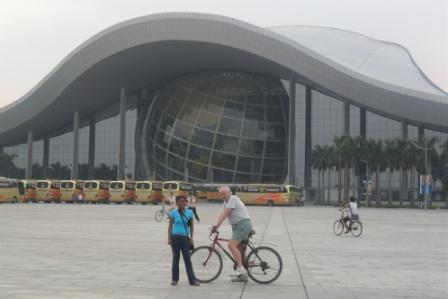
Chris Whiteley, Professor of Biochemistry, Microbiology & Biotechnology at Rhodes, recently sent one of his students, Eden Rebecca Padayachee, to China to interact with Chinese professors and students on protein docking and enzymology.
Padayachee was in China for four weeks as a result of Prof Whiteley’s collaboration with other professors at the South China University of Technology (SCUT) in Guangzhou Province (the location of the 2010 Asian games).
The student was involved in performing protein docking, which is an optimisation problem that would describe the “best-fit” orientation of a ligand that binds to a particular protein of interest using software docking programmes. It can be likened to a “lock-and-key” scenario where finding the correct relative orientation of the “key” which will open up the “lock”. Here, the protein is seen as the “lock” and the ligand as a “key”.
The software programme that was used was called Discovery Studio which enabled the docking of the ligand (amyloid peptide) to the enzyme (neuronal nitric oxide synthase). Elucidating the binding mechanism of both amyloid and enzyme is crucial to gaining mechanistic insight into Alzheimer’s disease.
Padayachee enjoyed spending time with other Chinese students and experiencing their culture and lifestyle. She said, “My interaction with the Chinese education system has instilled in me a strong work ethic and a balanced approach to research. Chinese students have a strong sense of self discipline and are hard workers, qualities worthy of emulation.
“They enjoy playing snooker and karaoke after a hard day’s work. Their food consists mainly of vegetables and rice which impressed upon me the importance of healthy nutrition. I formed lasting friendships with many Chinese students and have forged memories to last me a lifetime. My professor is eager to send me to China again in 2011 for three months to continue protein docking at SCUT. I am more than eager and have already started looking for travel funds.”
Padayachee also attended the ISN/APSN* School at the Centre of Neuroscience, Faculty of Science, Mahidol University, Bangkok, Thailand. She learnt new techniques of embryonic stem cell culture and isolation and High Performance Liquid Chromatography (HPLC) in Thailand.
The school was held in conjunction with the APSN neuroscience conference held at Phuket, Thailand where Padayachee presented a poster entitled “Neuronal nitric oxide synthase and interaction with beta-amyloid peptides as a biomarker for Alzheimer’s disease. The research abstract was published in the Journal of Neurochemistry,vol.115,October 2010.
Padayachee said, “I was exposed to an array of cultural diversity and met researchers from India, America and Australia. I was the only delegate selected from South Africa.”
She concluded by expressing her appreciation to Rhodes University, Joint Research Council for the trip, “I learnt that the beauty in research lies in embracing diversity which breeds innovation. Such innovation will build upon the knowledge hub in Africa and I was proud to be part of bringing Alzheimer research from Africa to the world.”
* International Society of Neurochemistry |Asian-Pacific Society of Neurochemistry.
Pic: Eden Rebecca Padayachee and Professor Chris Whiteley in front of the Science Center building in Guangzhou, South China.
